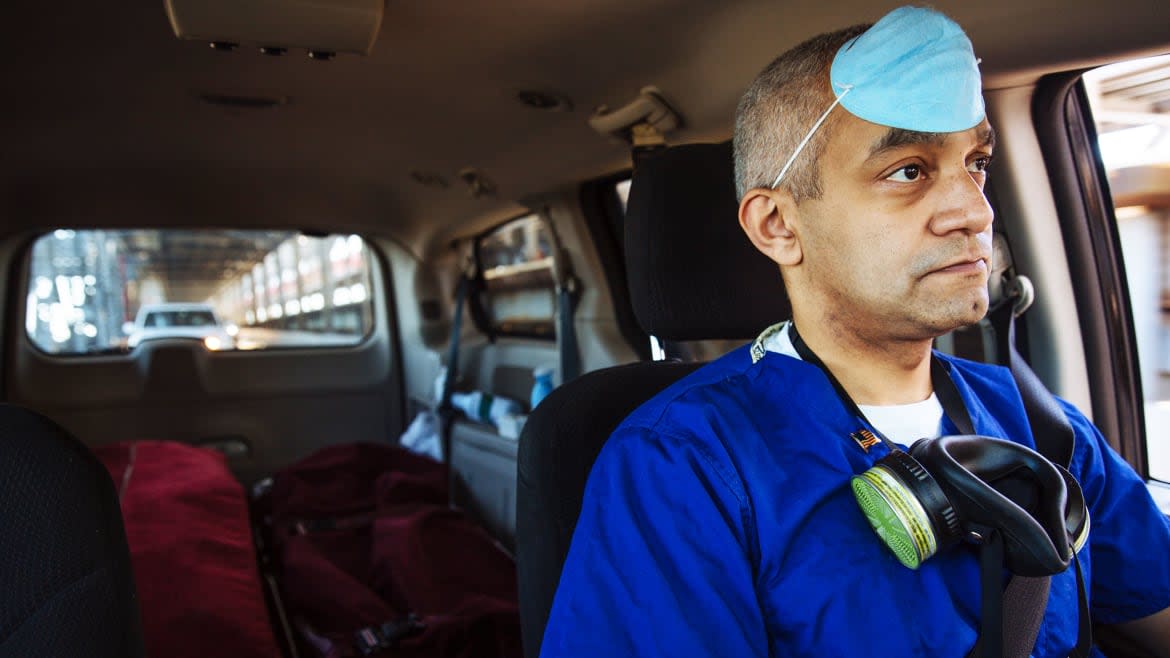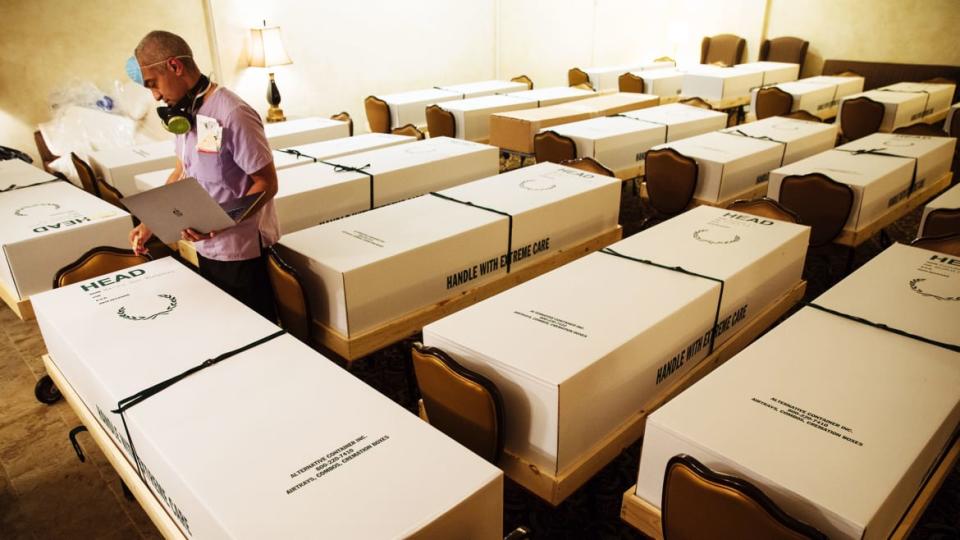This Is the Funniest Film You’ll Ever See About COVID

- Oops!Something went wrong.Please try again later.
There’s nothing obviously funny about a pandemic. In the early days of 2020, as a new contagious virus began to circulate inside the United States and deaths piled up, there wasn’t much to laugh about. Across the country, store shelves were emptied in fits of panic buying before once busy areas fell silent altogether as people were ordered or chose to stay home, in turn leading to countless livelihoods being destroyed and educations disrupted.
In those frightful first weeks, New York City became the epicenter of the crisis in the U.S. Between the beginning of March—when the first case of COVID was confirmed in the city—and early April, thousands died. Soldiers were sent to support the local health-care system that was creaking under the strain of an astonishing influx of extremely sick patients and, in the cases of those who could not be saved, troops collected the bodies of the dead.
Now, a little over three years later, America is still reckoning with the solemn costs of COVID, a scourge that claimed the lives of over 1 million people in this country alone. The serious work of calculating the pandemic’s consequences will go on for years, perhaps decades, to come. For many, it’s still impossible to see the funny side.
But for some of those working on the frontline of COVID—nurses, EMTs, delivery drivers—a sense of humor was an essential part of getting through the brutal daily reality with which they were confronted. This curious grace is captured in Handle With Extreme Care, a documentary film that premiered at the Sheffield Doc Fest in the U.K. following one funeral home in the Elmhurst neighborhood of Queens during the first wave of COVID.
“When we got there, it was already very bad,” Bowie Alexander, one of the film’s directors, tells The Daily Beast. “It always seemed really bad up until the end. At like three months into it, which was June, was when the first wave in New York was ending. But we got in there April 3, and they had too many bodies. They couldn’t take any more. It continued to be that way up until the very end of shooting.”
Even in such trying circumstances, the staff at the Gerard J. Neufeld, Inc. Funeral Home managed to still find ways to make each other laugh. “There seems to be a certain type of person that is attracted to this type of work,” Alexander says. “And it comes with a certain type of humor.”
This Could Be the Only Way to Beat COVID for Good
“People die in the most awkward places,” Ray Neufeld explains in the movie. “They die in the bathtub. They die in the attic. They die stuck between the toilet bowl and the sink and possibly the tub. You gotta get ’em outta there. But I’ve had four hernias repaired from doing this.”
Alexander’s film begins with a shot inside the funeral home’s chapel which, out of grim necessity, had been converted into a storage area filled with rows of cardboard boxes—marked with “handle with extreme care”—containing bodies. The staff squabble among themselves about who should have to be tasked with calling up a family and telling them, due to a mix up at a hospital, their relative’s body has gone missing.
But the workers manage to remain cheerful even in the midst of such trying situations. As one SUNY Canton professor supporting the funeral home in the documentary puts it: “Humor in the funeral industry is a defense mechanism. The mind can only take so much seriousness.”
“Do you want to use gloves or just raw dog it?” Omar Rodriguez, one of the funeral home’s staff, asks Ray at another point in the film as they move a body. “After I grab it, then you tell me I should have used gloves?” Ray replies. Later, as four of the workers carefully load another body into a packed SUV, Ray says: “Boy, that’s tight.” More than one of them replies: “That’s what she said.”
As well as the seam of gallows humor which runs throughout the documentary, the film also shows the unimaginable pressure placed on those tasked with dealing with the pandemic’s worst consequences. Joe Neufeld Sr. tells a news camera crew that his funeral home is starting work at “seven in the morning, and we go to midnight every night.” “We’re dealing with bodies, we’re not conducting services,” Ray says later. “We’re not having full funerals. We’re just dealing with body disposal. That’s what it’s come to.” He adds: “There’s nothing sacred in this anymore.”
For the ceremonies that are shown in the film, scant numbers of masked mourners stand safe distances apart. Prayers and condolences are shared via video call. A news segment in the film explains that the home is under pressure to take bodies from morgues to avoid them being sent to Hart Island—where mass graves were dug in a potter’s field to bury unclaimed bodies.

Those heartbroken mourners were a constant reminder to Alexander of the gravity of what the funeral workers were tasked with in contrast to their cheerful personalities. “You sort of go from this very sort of mechanical world of these like good old jolly boys to ‘Oh, yes, this is what is actually happening,’ which was dealing with those families,” he says.
The documentary, which is still working on a U.S. distribution deal, further captures the everyday struggles and annoyances that those who worked throughout the pandemic nevertheless had to endure even as they went about their labor. Arguments about food. Ray’s search for a partner on dating apps. An ice-cream seller completely losing patience with a colleague who keeps interrupting him as he tries to share his philosophy on the importance of life and appreciating your loved ones.
But the most poignant personal issue in the film affects Omar, the funeral home worker, whose personal life overlaps with his daily professional work of responding to the fallout of the pandemic when his father becomes seriously ill with COVID. Like many others, Omar heroically continued going about his job responding to the worst consequences of the virus even as those consequences played out in his own family.
Alexander said he “100 percent” believes the funeral industry was somewhat forgotten about throughout the pandemic, which in part motivated him to make his film. “You don’t hear much about this, right? And they are dealing, actually, with the bodies—just as much as people are in hospitals. I think it’s just something that people—they don’t think about this industry a lot. I think it is overlooked and that’s why it felt like a great opportunity to be able to do this and highlight their work.”
Get the Daily Beast's biggest scoops and scandals delivered right to your inbox. Sign up now.
Stay informed and gain unlimited access to the Daily Beast's unmatched reporting. Subscribe now.

